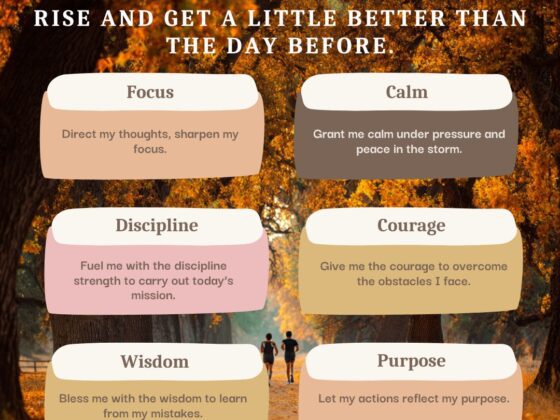Have you ever felt overwhelmed?
Have you ever had too much on your plate?
We all have our limits. I work well under pressure, but there is always a tipping point where things become overwhelming.
Typically, it is because I have said yes to too many things.
I have taken on too many commitments at work.
I have said yes to too many things to help my close friends and family.
It even happens when I say yes too many times and have too many projects simultaneously!
Learning to say no is a crucial skill many must actively work to develop.
Saying no is a superpower because it allows you to set boundaries, prioritize your time and energy, and focus on what truly matters.
It often can feel difficult to say no because it involves disappointing others.
We don’t want to be confronted with social expectations, and you don’t want to be the only one who says you would rather stay home tonight instead of attending the next party.
Many find it difficult to deal with the guilt of saying no, but it is important to remember that mastering the ability to say no is essential for setting boundaries and maintaining one’s mental and emotional well-being.
It empowers you to focus on your goals and priorities, which can ultimately lead to a more fulfilling and balanced life.
Learning to say no is something many people have to learn. It is not easy to do.
The Negative Consequences of Not Saying No
Before jumping into that, what negative consequences can impact your focus if you do not learn to say no?
As you go through this list, I want you to also consider the cumulative nature of these negative points. Typically, many of these items happen simultaneously, further adding to the destructive nature of not being able to say no to things.
- Overcommitment – If you take on too many tasks and responsibilities, you can become overwhelmed and stressed. This is the one I fall for all the time. Especially when I do not say no to myself. I often accomplish too many things simultaneously without a clear plan and schedule. I start the day just planning to get some yard work done. Then, I want to spend some quality time with the kids. But then I also want to get to that workout, write my next newsletter, learn something new, and write five posts on X. Before I know it, I feel overwhelmed and stressed. I get impatient with my wife or angry at the kids for something stupid.
- Decreased Productivity – Juggling multiple commitments can cause you to lose focus and reduce the quality and efficiency of your work. As in the example above, when I am not saying no to projects, tasks, and requests, I lose focus, and my productivity decreases. The impact of trying to multitask is an article I should write myself, but here are three articles that call out the challenges related to multitasking:
- Burnout – How many of you have just lost interest in the goals you are working towards because you feel burned out? Trying to take on too many tasks and not learning to say no can kill your dreams right in their steps because you become burned out. Constantly saying yes can lead to physical and mental exhaustion. This impairs your ability to perform effectively, and you become burned out. This was a major contributing factor to my shutting down the first business I started while still living in Japan. The customer service requirements led to a forced requirement where I found myself saying yes to too many things. I became burned out and lost my enthusiasm and joy for the business I was trying to start.
- Lack of Prioritization – How many of you have experienced the feeling that you have completely lost your ability to prioritize? This often happens because we say yes to everything without considering the priority of the other tasks we are already working on. It becomes difficult to focus on high-priority tasks without the ability to say no. This leads to missed opportunities and unfulfilled goals.
- Reduced Quality of Work – There are only twenty-four hours in a day. How many hours can you use to focus on the most important things to your personal success? Not being able to say no means that you are taking on so much work that you must sacrifice the quality of work to meet all the deadlines. Spreading yourself too thin can result in poor performance because you must distribute your time and focus across multiple tasks and priorities. We are only human and can only do a few things well, and we lose quality because of quantity.
- Increased Stress and Fatigue – How often do you feel overly stressed from your workload? This often comes from taking on too much work. Again, this is a reflection of your ability to say no. This becomes amplified when you doing work to meet the goals of others and not yourself! Forced multi-tasking from our inability to say no can increase stress and mental fatigue. This makes it more difficult to maintain focus, and over time, we lose productivity. Remember how I said the effects are cumulative? If you become stressed and fatigued, you are going to produce less quality of work and experience burnout.
- Strained Relationships – What can be more stressful than people constantly asking you to do things? Are there certain numbers that pop up on your phone that immediately make you want to run and hide? How about people who you have an instant flight response when they walk into your office? This kind of pressure can damage relationships with certain people in your life. This over-commitment or inability to say no can lead to avoiding and neglecting people, which can cause strain and resentment.
- Loss of Control – Failing to set boundaries can make you feel like you have no control over your life, reducing your sense of autonomy and fulfillment.
Learning to say no is crucial for maintaining focus, protecting your time and energy, and dedicating yourself to what truly matters.
The Benefits of Say No
This is by no means a comprehensive list, but there are benefits to mastering the ability to say no.
- Protect Your Time: Time is your most valuable asset. It is a limited resource that we can never get back once used. Not saying no to things distracting you from your true priorities in life is eating up this valued resource. By saying no, you avoid overcommitment and ensure you have time for your priorities and personal goals. “Guard your time fiercely. Be generous with it, but be intentional about it.” – David DuChemin
- Maintain Energy and Focus: Your energy is your second most important resource. It prevents burnout and helps you focus on tasks aligning with your values and objectives. It is a resource that dissipates with too many distractions. The worst-case scenario could be not having any energy to pursue a once-in-a-lifetime opportunity that drops right in your lap. Say no and conserve your energy. “Your energy is your most precious resource. Protect it, invest it wisely, and let it flow towards things that matter most.” – Unknown
- Enhance Productivity: We humans are not good at multitasking. Say no to the things distracting you from your life’s priorities. You can concentrate on high-impact activities that drive your success by avoiding distractions. “Focus on being productive instead of busy.” – Tim Ferriss
- Assert Control: Get your control back. It is your life. It is your journey. It all belongs to you. Saying no empowers you to take control of your life, making decisions based on your needs and desires rather than external pressures. “You have to decide what your highest priorities are and have the courage—pleasantly, smilingly, non-apologetically—to say no to other things. And the way you do that is by having a bigger yes burning inside.” – Stephen Covey
- Improve Relationships: Instead of being pissed at people all the time because they are giving you too much work, the ability to say no will help you to take control of the situation and set boundaries and expectations. Setting boundaries can lead to healthier, more respectful relationships where your time and efforts are valued. “Saying no can be the ultimate self-care. It allows you to set boundaries and maintain your energy, improving the quality of your relationships.” – Unknown
The ability to say no strengthens your autonomy, leading to a more balanced, fulfilling, and successful life.
How the Hell Do I Say No?
As with every newsletter on this topic, developing the ability to say no is important. The more important question is, how do you do it?
This is one of the more challenging skills to add to your skill stack.
It comes down to your priorities. If your goals and priorities are important to you, it will become easier to focus on those priorities and say no.
If you do not have a clear vision and a clear set of priorities you are driving towards, developing the ability to say no may be more challenging.
The act of saying no is really about making yourself the priority, which is not always easy.
Here are a few pieces of advice to help you develop the ability to say no.
Understand You Priorities
Knowing your priorities is probably the most important thing, as it helps you decide what aligns with your values and goals and what does not.
If you are unclear about your priorities, write them down, then write them down again. Become crystal clear on your priorities. Write to figure out where you are going.
When you are clear about your priorities, declining requests that don’t support them is easier.
The more passionate you are about your priorities, the easier it becomes to say no.
This clarity, passion, discipline, and drive are really important because they transition you from guilt about saying no to all the positive feelings you get by saying no because it allows you to focus on what is most important to you.
“There’s no greater feeling than knowing you are exactly where you’re supposed to be, doing exactly what you’re meant to do.” – Oprah Winfrey
None of us have the willpower to fight all the negative feelings that come with saying no. Instead, you have to implement a system that replaces these negative feelings with positive feelings of accomplishment.
An effective system that replaces the negative feeling of saying no with the positive feeling of focusing on your priorities involves a combination of clear goal-setting, prioritization techniques, and reflective practices.
Be clear about your goals and set your priorities. When people ask you to do things, take the time to reflect on whether these things align with your priorities and goals.
Practice Assertiveness
A basic definition of assertiveness is being self-assured and confident without being aggressive.
It involves expressing your thoughts, feelings and needs directly, honestly, and respectfully while respecting the rights of others. Assertiveness is a key communication skill that helps individuals navigate personal and professional relationships more effectively.
Some of the key aspects of being assertive would be:
- Direct communication – Assertive people communicate their needs, desires, and opinions clearly and directly. They do not beat around the bush. They make their values and priorities easily understood.
- Respect for yourself and others – Assertiveness means standing up for yourself while at the same time respecting the opinions of others. It is about finding a balance between standing up for your values and priorities while not being overly aggressive.
- Self-confidence – An assertive person has confidence in their own values and priorities. They believe in their own self-worth and stand up for their personal rights.
- Self-awareness (Honesty about your emotions)- Being assertive means being honest about your emotions and expressing them appropriately.
- Responsibility – Assertive people take responsibility for their actions and emotions. They do not blame others. Consider this when you are saying no. You are not saying no because someone else is causing you trouble; you are saying no because your priorities and values are important.
Practice saying no with a firm or polite nature.
This does not mean being an asshole about it. Being respectful will take you much further than being a jerk about it.
Remember, the most important point is that this is about your priorities. It is critical that you set boundaries.
I noted some benefits to saying no above, but being assertive generally also has a few benefits.
- Improved communication – assertiveness enhances your ability to become a clear communicator. You can communicate with more clarity, which, in turn, reduces misunderstandings. When you say no, the receiver of the no will clearly understand why you are saying no and, in turn, reduce the chances that they will be trying to steal your time again in the future.
- Stronger Relationships – By being assertive and expressing what you need while still showing respect for others, you can build healthier and more respectful relationships. This allows you to take back your energy and maintain your ground, creating a more positive environment for good relationships with those around you.
- Increased Self-Esteem – There is nothing better than the regular practice of being assertive and standing up for what is important to you to increase your self–esteem. Successfully expressing oneself boosts self-confidence and self-respect.
- Reduced Stress – This goes without saying. Being assertive and expressing yourself instead of keeping what is important to you locked away inside is a great way to reduce stress. Communicating what is important to you and setting boundaries is an incredible way to reduce stress.
- Better Decision-Making – If you are assertive and focused on your priorities, you will make better decisions. If you are assertive, you make decisions based on your values and goals.
“Whenever you find yourself on the side of the majority, it is time to pause and reflect.” – Mark Twain
This quote encourages individuals to think independently and assertively and make choices that align with their own values and beliefs rather than burden themselves with the requests of others.
Use a Delayed Response
Understanding the request is one of the biggest challenges when people ask you to support their projects with your time. Often, we respond reactively to a request because we do not have time to think about it, and it is easier to just put it on the list and deal with it later.
Using a delayed response provides you with the time to evaluate your priorities and decide if taking on the new task is feasible without overcommitting yourself.
If done correctly, it also shows respect for the requestor’s need by considering their request.
- First, you acknowledge the request by thanking the person who considered you. Let them know that you appreciate their feeling that you are important enough to them to make the request.
- Next, you would mention needing time to assess your schedule and commitments.
- Lastly, specify a timeframe for a follow-up and when you will give them a response.
Consider a school friend who asks you to help with a project that will require a significant amount of your time over the next few weeks.
Your response could be, “Thanks for considering me for this project. I need to check my current workload and commitments to ensure I can give it the attention it deserves. Can I reply by the end of the day (or tomorrow)?”
This approach’s shortcoming is that you may just be delaying the inevitable “no” to the request, but there are some benefits.
This approach helps reduce or eliminate immediate pressure and gives you time to consider your decision. It will improve the quality of your decision because it gives you the time to understand if the request aligns with your values and priorities. It also helps you maintain a level of professionalism. It shows that you are considerate and organized, and it looks like a logical rather than emotional response.
Using a delayed response, you can handle requests more effectively and control your schedule.
Offer Alternatives
This is a great option if you are not comfortable saying no outright.
This does feel like more of a time management option, and it does not address the issue if you need to say no because the request is distracting you from your priorities.
If the request conflicts with your values and distracts from the goals you are trying to accomplish, a more aggressive approach might be required. However, if it is more of a time management issue, try to offer alternatives.
Let’s say that you have a friend who asks you to help organize a weekend event to promote a new product he is trying to sell, but you have a significant deadline approaching for your own personal project.
Giving a straightforward no is the more direct way to remain focused on your own project.
You could also respond: “Thank you for asking for my help with the event. Unfortunately, I have a major deadline approaching, and I won’t be able to dedicate the time needed. However, I can recommend a few resources and suggest some strategies that might be useful. I can also help with some preliminary planning early next week if that works for you.”
Using alternatives when saying no can help soften the refusal and still provide assistance.
- Acknowledge the request – You are not just saying no; instead, you started by showing some appreciation that your friend considered you for the request.
- State your conflict – Be transparent about why you cannot fulfill the request. Don’t lie because that stuff tends to come back and bite you in the butt, and remembering all the lies you tell creates another source of stress.
- Offer alternatives – Suggest useful resources or tools. Introduce yourself to some other friends who can help. Delegate to someone else on your team. Offer strategies or advice related to the request or task. You might not be able to help directly, but you can point the person in the right direction to help them.
While saying no is the most direct approach, using alternatives effectively can help you maintain focus on your priorities while still being supportive and helpful to others.
Stay Firm and Consistent.
Ultimately, you have to remain consistent once your decision has been made.
Using alternatives effectively can help you maintain focus on your priorities while still being supportive and helpful to others.
It is really hard to learn how to say no to someone and prioritize your own goals and projects.
Being firm and consistent after saying no helps establish and reinforce your personal boundaries. It communicates to others what you are willing and not willing to do, helping to define clear limits. This consistency is essential for maintaining respect and ensuring that your boundaries are not crossed repeatedly.
This consistency in your application of “no” also helps to build trust with others. If they understand that no means no, they will respect your decisions and not push against your boundaries with future requests. Remaining firm is key. If you are wishy-washy and give in, it will be harder to say no the next time.
Sticking to your guns when saying no also helps maintain your integrity and self-respect. It builds confidence. It is fulfilling to know that you are strong enough to say no and make the things important to you a priority.

Remaining consistent once you say no is essential for maintaining boundaries, building trust, preserving integrity, preventing overcommitment, and enhancing focus and productivity. It reinforces the importance of your time and priorities, helping you live a more balanced and fulfilling life.
More importantly, it lets you remain focused on the most important things to make you the best dad, man, and husband you can be.
If you enjoyed this newsletter, please subscribe.
If you want to have a deeper discussion about this subject, please contact The Day Warrior.










